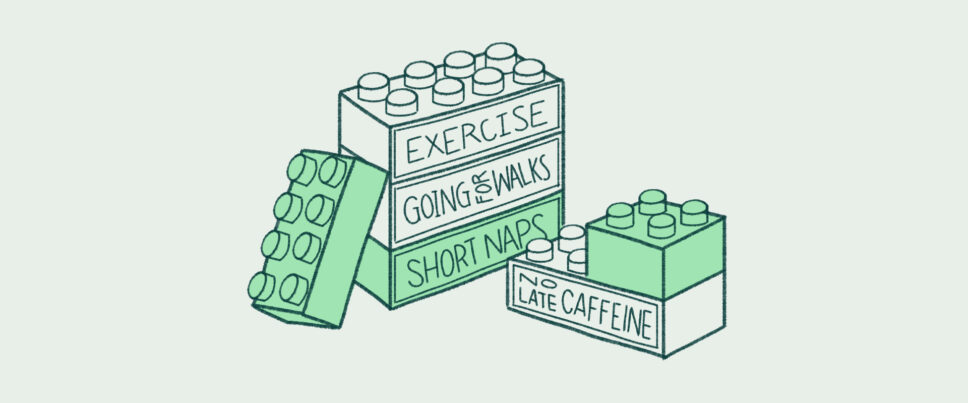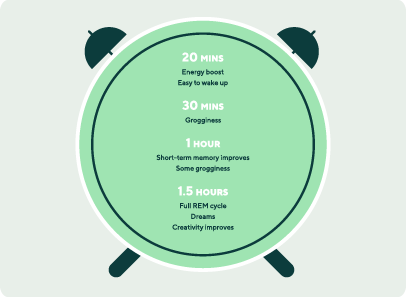
In our previous article, we showed you how to optimise your bedtime routine to help you get a good night’s sleep. As everything we do throughout the day impacts our sleep, however, we need to make sure that we’re implementing pro-sleep habits from the moment we wake up. In this article, we’ll share more tips to help ensure you get all of your 40 winks.
Spend time outside
Light levels are key in regulating our circadian rhythm. Exposing yourself to daylight as early as possible signals to your body that it’s morning and kicks your brain into action. This is especially important in the winter months when daylight hours are much shorter.
Natural light also impacts the production of melatonin, our sleep hormone. In darkness, our brains produce melatonin (which increases drowsiness) but exposure to light reduces this. Therefore, if we aren’t regularly exposed to daylight earlier in the day, we can feel drowsy throughout the day and this can throw off our sleep schedule!
If you can, expose yourself to natural light by going out for a morning or lunchtime walk!
Exercise regularly
Research has shown that among its many benefits, regular exercise can improve our sleep quality and reduce the time that it takes us to fall asleep. Getting enough sleep can also boost our energy levels and motivation to exercise – so it’s a win-win situation!
It’s also important to consider the timing and intensity of your exercise. Research has shown that intense exercise within 3 hours of bedtime can negatively impact our sleep as it increases our heart rate, core body temperature, and adrenaline levels. Lower-intensity activities like yoga and stretching may be more suited to this time of day. Everyone’s different, however, so it’s important to find what works for you.
Avoid caffeine later in the day
You probably aren’t drinking coffee right before bed, but avoiding caffeine much earlier in the day can help you sleep better and for longer.
Caffeine keeps us alert by blocking adenosine, the neurotransmitter that induces drowsiness. It also has a half-life of around 5 to 6 hours – this means that if we have a coffee at midday, half of its caffeine will still be in our system at around 6pm, and a quarter will still be there at midnight.
Try to reduce your intake of caffeine in the afternoon by switching to caffeine-free drinks like herbal teas or opt for decaf tea or coffee – just be mindful that decaf versions will still contain a small amount of caffeine. Again, it’s always best to experiment and see what works best for you!
Napping

Naps can either be beneficial or detrimental to your sleep, so it’s important to get the timing and length of your naps just right.
Sleep pressure – our natural urge to sleep – builds throughout the day, increasing our need for sleep. When we nap, the pressure decreases, so napping for hours can negatively affect how sleepy we feel at bedtime and how easily we fall asleep.
By contrast, shorter naps give us the benefits of getting a bit of extra sleep without compromising our sleep at night. According to research, the best nap length is between 10 and 30 minutes.
The time we take a nap is also an important factor. Nodding off too early or late in the day changes the type of sleep that we experience which has been shown to affect our ability to sleep at night. Generally, it’s recommended that you should nap no later than 2pm.
Take Action ⚡
Over the next week, implement some of these habits into your daily routine:
- Go out for a morning walk in the daylight
- Avoid caffeinated drinks in the afternoon
- Switch to decaf tea or coffee in the afternoon
- Reduce naps to 10 to 30 minutes
- Exercise earlier in the day if you can
- Swap high-intensity exercise in the evening for something more gentle
All of these habits can make a huge difference when it comes to maintaining a consistent sleep routine and getting a better night’s sleep!
Benefits of napping in healthy adults: impact of nap length, time of day, age, and experience with napping https://pubmed.ncbi.nlm.nih.gov/19645971/
Coffee, caffeine, and sleep: A systematic review of epidemiological studies and randomised controlled trials https://pubmed.ncbi.nlm.nih.gov/26899133/
The human circadian rhythm entrains to sun time https://www.cell.com/current-biology/pdf/S0960-9822(06)02609-1.pdf
Exercise training improves sleep quality in middle-aged and older adults with sleep problems: a systematic review https://pubmed.ncbi.nlm.nih.gov/22884182/
While we've ensured that everything you read on the Health Centre is medically reviewed and approved, information presented here is not intended to be a substitute for professional medical advice, diagnosis, or treatment. It should never be relied upon for specific medical advice. If you have any questions or concerns, please talk to your doctor.




